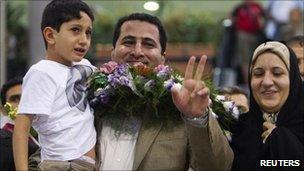Iranian scientist Shahram Amiri returns home
- Published
Shahram Amiri says he was subjected to "the harshest mental and physical torture"
An Iranian scientist who claims he was kidnapped by the CIA in Saudi Arabia a year ago and taken to the United States has arrived back in Iran.
After greeting members of his family at Tehran airport, Shahram Amiri told reporters he had been subjected to "the harshest mental and physical torture".
He also denied that he had been heavily involved in Iran's nuclear programme.
On Monday, Mr Amiri went to the Iranian interests section of Pakistan's embassy in the US and asked to be repatriated.
The US state department insisted he was in the country "of his own free will" and raised no objections about his return to Iran.
'Israeli agents'
Wearing a beige suit, a smiling Mr Amiri was greeted at Tehran's international airport early on Thursday by his tearful son and wife, along with other family members and Deputy Foreign Minister, Hassan Qashqavi.
Speaking at a news conference afterwards, he repeated his earlier claims that he had been abducted by US agents while undertaking the Hajj pilgrimage in the Saudi Arabian city of Medina.
Mr Amiri said he was placed under intense pressure by his interrogators to co-operate in the first months following his alleged kidnapping.
"I was under the harshest mental and physical torture," he said, adding that Israeli agents had been present during the interrogations and that the CIA had offered him $50m to remain in the US.
"The Americans wanted me to say that I defected to America of my own will to use me for revealing some false information about Iran's nuclear work."
Mr Amiri offered no evidence, but said he would eventually.
"I have some documents proving that I've not been free in the United States and have always been under the control of armed agents of US intelligence services."
He also denied he had been heavily involved in Iran's nuclear programme, saying he was a "simple researcher who was working at a university".
"I'm not involved in any confidential jobs. I had no classified information."
Some unconfirmed reports said he worked for Iran's atomic energy organisation.
Mr Qashqavi thanked the scientist for his "resistance to pressure".
He rejected suggestions that Mr Amiri's release was linked to a possible deal to release three US hikers who have been detained in Iran since 2009.
'Breakdown'
In the US, unnamed officials and security sources are claiming that Mr Amiri defected and was put into a programme similar to a witness-protection scheme.

Shahram Amiri was greeted at Tehran's airport by his tearful son and wife
Later, he apparently became concerned for family members he had left behind, had a breakdown and decided to return to Iran, US reports claim.
A US official told the BBC: "He provided useful information to the United States. The Iranians now have him. In terms of win-loss, it's not even a close call."
In its online edition, The Washington Post newspaper quoted unnamed officials saying Mr Amiri had been working for the CIA for more than a year and was paid $5m.
In June, the Iranian government announced that it had handed evidence to the US that the scientist had been abducted.
It came shortly after Mr Amiri appeared in two videos posted on the internet giving conflicting stories about how he had arrived in the US.
He said in the first that he had been kidnapped by CIA and Saudi agents while on a pilgrimage. In the second message, he said he had gone to the US to improve his education and was living freely in Arizona.
In a third message posted on the internet later that month, Mr Amiri said he had escaped from US custody and was on the run in Virginia.
In an interview with Iranian state Press TV before he left the US, Mr Amiri said he was in Medina when three men in a van posing as fellow pilgrims offered him a ride.
"As I sat down, the man in back held a gun toward me and told me to keep quiet," he said.
"They took me to a secret place and injected me, and when I woke up I saw myself in a huge airplane" and was taken to the US.
The US state department repeatedly denied it had kidnapped him, but never said that he was not in the country.
However on Tuesday, Secretary of State Hillary Clinton acknowledged publicly for the first time that the scientist was indeed in the US.
- Published13 July 2010
- Published14 July 2010
- Published14 July 2010